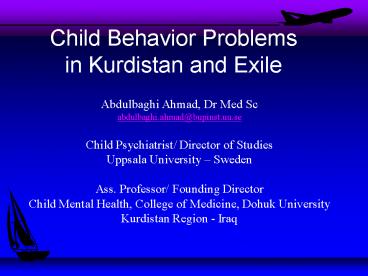Child Behavior Problems in Kurdistan and Exile PowerPoint PPT Presentation
Title: Child Behavior Problems in Kurdistan and Exile
1
Child Behavior Problemsin Kurdistan and Exile
- Abdulbaghi Ahmad, Dr Med Sc
- abdulbaghi.ahmad_at_bupinst.uu.se
- Child Psychiatrist/ Director of Studies
- Uppsala University Sweden
- Ass. Professor/ Founding Director
- Child Mental Health, College of Medicine, Dohuk
University - Kurdistan Region - Iraq
2
Study Design
- Prevalence and Correlates
- Kurdistan and Sweden
- 6 18 years Children Parents
- HUTQ-C PTSS-C Child Interview
- CBCL Genogram Parent Interview
3
Subject Characteristics (N
303) Duhok Uppsala N (M/) N
(M/) Age (years) 201 (13.0) 102
(11.6) Girls 101 (50.2) 63 (61.8) Boys 100
(49.8) 39 (38.2) Mother working 10 (5.0) 29
(26.1) Father working 157 (78.1) 95
(93.1) Mother high education 6 (3.0) 59
(57.8) Father high education 25 (12.4) 43
(42.1) Trauma level 201 (24.3) 102
(10.7) p lt 0.01, p lt 0.001, N Number
of observations, M Means
4
(No Transcript)
5
(No Transcript)
6
(No Transcript)
7
Correlations Externalizing Internalizin
g Life spent in Sweden -0.05 -0.22 Life
spent in Kurdistan 0.04 0.21 Father
education -0.04 -0.18 Mother
education -0.02 -0.17 Trauma
level 0.12 -0.06 Single parent
family -0.06 0.11 Father working 0.03 -0.1
1 Mother working -0.03 -0.08 Living
standard 0.03 -0.11 Father absent -0.05 0.
11 p lt 0.01, p lt 0.001
8
Conclusions
- Higher Internalizing in Kurdistan than Exile
- Essentially Similar Externalizing
- Living in Exile is Healing for Internalizing
- Internalizing Correlates with Environment
- Externalizing Correlates with Personal Factors
- Is Externalizing Genetically Determined?
PowerShow.com is a leading presentation sharing website. It has millions of presentations already uploaded and available with 1,000s more being uploaded by its users every day. Whatever your area of interest, here you’ll be able to find and view presentations you’ll love and possibly download. And, best of all, it is completely free and easy to use.
You might even have a presentation you’d like to share with others. If so, just upload it to PowerShow.com. We’ll convert it to an HTML5 slideshow that includes all the media types you’ve already added: audio, video, music, pictures, animations and transition effects. Then you can share it with your target audience as well as PowerShow.com’s millions of monthly visitors. And, again, it’s all free.
About the Developers
PowerShow.com is brought to you by CrystalGraphics, the award-winning developer and market-leading publisher of rich-media enhancement products for presentations. Our product offerings include millions of PowerPoint templates, diagrams, animated 3D characters and more.

